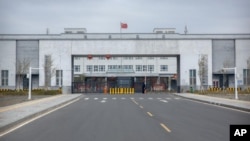Journalist Megha Rajagopalan has made a name for herself over the years covering the plight of Uyghurs in the autonomous Xinjiang region in northwestern China.
When Beijing denied her visa renewal in 2018, the Buzzfeed News reporter refused to be deterred. With access to residents and on-the-ground reporting limited, Rajagopalan found unique ways to broaden her coverage.
Her efforts, which included analyzing satellite imagery to search for evidence of mass prison and internment camps, earned Rajagopalan and her team -- architect Alison Killing and digital security trainer Christo Buschek--a Pulitzer Prize this year.
The United States, Britain, United Nations and others have condemned Beijing for human rights abuses including reports of torture, forced labor and sterilization in Xinjiang — sometimes called East Turkestan by Uyghurs and their supporters -- where China is detaining more than 1 million Uyghurs and other ethnic groups.
Beijing denies wrongdoing and rejects accusations by some that the abuses constitute genocide. It has accused Western media of bias and fake news over the coverage, and expelled or refused to renew visas for some journalists.
In Rajagopalan’s case, she says Beijing never provided a clear reason for denying her visa.
But while Rajagopalan told VOA she couldn’t definitively say why the visa was blocked, “it did come a few months after our first big piece from Xinjiang.”
Rajagopalan said she never considered stopping reporting on China after she left in 2018. She knew there was still a lot to uncover in Xinjiang and believed that could be done from outside.
The following are excerpts from a VOA interview with Rajagopalan. The questions and answers have been edited for length and clarity.
VOA: When Beijing declined to renew your visa, did you ever consider changing direction? What pushed you to still report on China?
Megha Rajagopalan: I have a unique job in that I get to cover a broad range of issues, often in different parts of the world, and that was true both when I was based in China and now. After I left China, I mainly wanted to continue reporting on the Xinjiang story because of the scale of the harm being done to people, the fact that there were ways to cover it from abroad including interviewing exiles, and because there was, and continues to be, a lot to uncover.
Since losing access, I've relied on interviewing Uyghur and Kazakh exiles who left the country and have relatively fresh memories of their experiences in Xinjiang. Other journalists, even those based in China, have used this same technique very successfully. It's helpful because of the ethical quandary of interviewing in Xinjiang, where sources often face police harassment and other repercussions.
I was extremely lucky to work with (geospatial analyst) Alison because she brought a totally different perspective and set of skills to approach the problem of geolocating camps and prisons in Xinjiang. Because we couldn't drive to all these camps and prisons, this was a different approach to documenting their locations.
Interviewing former detainees helped us fill in details that we couldn't get from satellite images alone. Former detainees helped us verify locations of camps and prisons, and conversely, using satellite images (meant) we could corroborate parts of their stories.
VOA: You started reporting on the experiences of Uyghurs in China a little less than a decade ago. How has your reporting, and more broadly, international coverage of this issue evolved since then?
Rajagopalan: I think the biggest evolution has been the period after about 2017, which is when we started to see and hear about internment camps and mass surveillance.
My biggest challenge today is lack of access, but that's a problem that all journalists working on China face to different degrees, including those in the country.
VOA: What does your experience of reporting on Xinjiang underscore about the current state of press freedom in China?
Rajagopalan: Diminishing freedom for the press in China has a much deeper impact on Chinese journalists and publications than it does on non-Chinese reporters like myself.
I feel very lucky in that I've been able to report on Xinjiang for many years, and though I've encountered some obstacles, nobody has ever stopped me from publishing my work. It would be a better world if journalists with Chinese nationality had the same freedom to investigate and to publish.
State media in China routinely criticize international reporting on Xinjiang--as well as a number of other topics. Determining the impact of these kinds of reports outside China is a difficult but worthwhile question.
VOA: Do you think the free press in democratic countries has been doing enough to cover the situation facing the Uyghurs?
Rajagopalan: It’s really important to understand that press freedom exists on a scale. It's not a binary thing where some countries simply have it or others do not. Journalists routinely face government pressure and attacks in democratic countries including the United States.
Conversely, there are many exceptional journalists working in authoritarian countries. I know some, outside China, who have pushed for their publications to cover the Xinjiang issue.
Building more awareness that these abuses are taking place is always good, but it's not a solution in and of itself.





